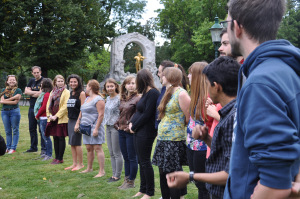
On a very warm, windy and pleasant Vienna day, the oikos CEE Meeting 2015 commenced. Participants travelled from more than seven countries to be united in learning more about the concept of Circular Economy and generate a flow of interesting perspectives and ideas to share.
On the first day the participants were escorted to the headquarters of Global 2000, a Vienna-based NGO working on sustainability projects. Linnéa Richter, a certified green cosmetics educator, introduced the group to the concept of sustainable cosmetics. First, statistics were introduced such as the fact that, on average, Europeans utilise 10-15 ‘beauty’ products per day. Second, she highlighted that it is difficult for the plastic used to package cosmetics to degrade and be recycled, thus, making the cosmetics industry unsustainable in nature. Third, the focus was shifted onto the ingredients that cosmetic products contain: adding onto the ‘unsustainable’ and ‘unhealthy’ factor. In order for the group to understand how easily one could avoid using commercial products and turn to using DIY products, Linnéa, guided participants to make their own deodorant and body butter. Participants were amused and surprised by how basic, fast and affordable it is to re-create mainstream products in a 100% natural fashion. The body butter was created out of apples, cinnamon, water and bee wax. The deodorant was composed out of oranges, lemons and baking soda. The results were colourful, pretty and participants took one sample of each product home.
On yet another warm second day, the first session was with Prof. Thomas Ertl from BOKU Wien – University of natural resources and life sciences Vienna. The topics of the session were the key elements in water cycles, the stakeholders and factors of efficient and sustainable water management. During the brainstorming, the participants had to answer the questions: How much water do we really use? Why does the water sometimes have no “cycle”? Who does actually need water? Who are the pollutants? Which is better for running the water services – private or public sector? the costs and revenues in water distribution services were also discussed. The second session was with Martin Wafler, from cewas and seecon international made us think about water as a resource. The session was full of interesting and valuable information, numbers and figures that we found unbelievably interesting and it was a natural start for passionate discussion. Participants were made aware of about strategies for saving water and one of the main conclusions was change in consumption habits. The most impressive information shared was the map of hot spots in Swiss water consumption that showed up that Switzerland imports goods mainly from regions in India, Russia and the Middle East. Mr. Wafler also talked about the water treatment and the difficulties of building a sanitation system. In the end it was an interesting workshop about the creating of the water, energy and raw materials flow chart.
Then the participants visited the biggest water bottling company in Austria – Vöslauer. At the company office, full of certificates showing of how sustainable the company is, they heard about the trends and figures in recycling and reusing of the bottles inside the company. The day ended with a visit to a thermal bath in the Vöslauer mineral water.
Day three started at Wirtschaftsuniversität Wien (WU – Vienna University of Economics & Business) where the participants were inspired by the brilliant lecture on “waste management” given by Mr. Benjamin Steuer (Circular Economy Researcher, WU). He enlightened them on how to convert the dangerous toxic waste into valuable energy resource which they then got to observe in action a bit later in the day, but also the hazards of how this is done by an informal e-waste recycling industry in China. The second speaker for the day was Elena Komarova from ALBA Group. And she talked about recycling technologies and the specific separation of materials that is essential for high-quality recycling. Very enriching was the discovery of green coal technology or in other words processing of residual waste into substitute fuel. ALBA is also turning used plastics into various forms of recycled plastics as recythene and procyclen which can be straightforward used for producing new products. Then was the visit to municipal department Die 48er waste management factory which served as a starting point for a waste management tour. The tour was aimed to give yhe participants a practical understanding of the lecture that was held earlier. The tour guide explained us the whole waste management processing system like how they convert waste (that smells really bad!) to bio-gas through the bio-mass incineration process. Overall, the tour enhanced the knowledge of the participants on waste handling. The different techniques of how the municipality is collecting and categorizing organic waste into kitchen scrap, gardens trimming waste and forest waste. These wastes are then later converted into bio energies in the form of bio-gas, soil enriching compost fertilizers, nitrate content for agriculture, which improves fertilization and plant health. Thus it clearly proves that the bio-gas plant is functioning in a sustainable manner, helping to eradicate 144,000 tons of carbon-dioxide annually and avoiding the risk of transmission of BSE diseases from animals to humans.
See you next year with more regional meetings!
This article is a collage of articles published on the oikos Vienna Blog, edited by Nimisha Ghorpade



